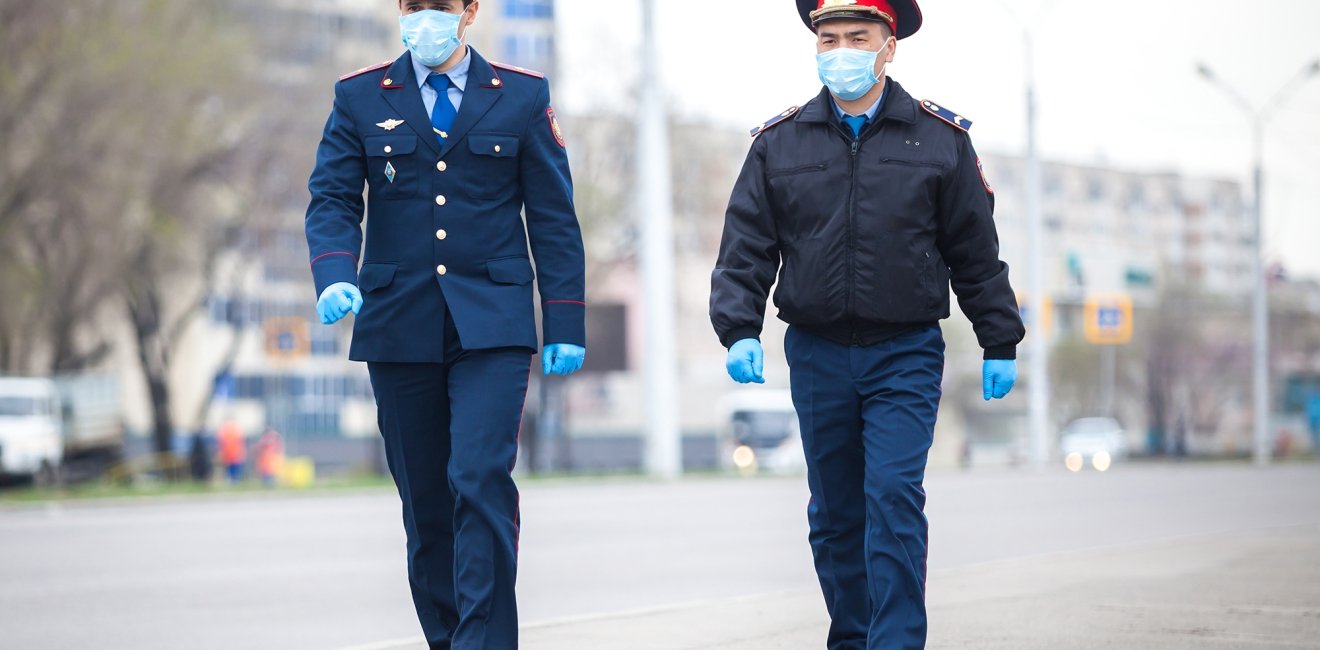
A blog of the Kennan Institute
BY VICTORIA CLEMENT
The countries of Central Asia, a region with long historical ties to Russia, have taken different paths in their response to the COVID-19 pandemic. A proactive stance and regional leadership in the face of the calamity, espoused by some of the region's nations, stands in sharp contrast to the strategy of denial embraced by others. This divergence strongly hints at the nations’ future trajectories vis-à-vis Russia and the world.
Two days after the World Health Organization (WHO) declared a global pandemic, the coronavirus was detected in Kazakhstan, and soon after also in Uzbekistan and Kyrgyzstan. These countries quickly closed their borders, cancelling mass events and shuttering schools. Since that time, the countries have been in varying stages of lockdown, with local governments taking measures to keep people at home and mitigate the crisis. In Turkmenistan, though certain other basic measures are still lacking, the government canceled flights to and from China in late January. It also sealed off the capital, Ashgabat, and restricted travel between provinces by buttoning up highways. Despite an irresponsible lack of social distancing, reports that Turkmenistan’s government had banned the word “coronavirus” were greatly exaggerated. Not only has the president spoken about the virus on the evening news, the government also put out a public service announcement in Turkmen explaining the basic meaning of “COVID-19.” But is this enough?
Every country in the world is dealing with a lack of medical equipment and funds to pay for the crisis. This is also true in Central Asia, where pandemic-borne problems are exacerbated by preexisting inadequacies in health care, mistrust in government, and failures of leadership. For example, rural areas typically lack clean water for household use. In Kazakhstan, locals have labeled Minister of Information and Communication Dauren Abayev the “Minister of Truth,” in an Orwellian reference to the lack of transparency in government that is only getting worse as rumors fly. In Turkmenistan, where the health care system has continuously eroded since the end of the Soviet Union, President Berdimuhamedow continues to tout herbal remedies and teas as cures for dire illnesses. Additionally, corruption is a pervasive problem. Out of 180 countries measured in Transparency International’s 2019 Corruption Perceptions Index, Kazakhstan, Kyrgyzstan, Tajikistan, Uzbekistan, and Turkmenistan ranked 113, 126, 153, 153, and 165, respectively.
Across the region, states use surveillance techniques and equipment, such as facial recognition cameras, to track people’s movements. In Kazakhstan these tools are being used to punish people who violate quarantine. This is strengthening the state’s powers and weakening individual rights in ways that may persist long after the end of the crisis.
Approaches to the crisis in Turkmenistan and Tajikistan are discouraging. Tajikistan, which is engaging in a “strategy of denial,” and Turkmenistan, already entrenched in a state of permanent denial, refuse to admit having any cases of coronavirus infection. They have neither established quarantines nor canceled mass gatherings. Indeed, in both countries, Nowruz celebrations on March 21 brought together thousands of people dancing and singing. Moreover, soccer games are planned, and schools continue to operate. In Turkmenistan, as late as March 27, President Berdimuhamedow sponsored a sadaka meal for 1,500 guests at the main mosque in Dashoguz, and on April 7 a mass bike ride with 7,000 participants celebrating World Health Day took place in Ashgabat. With these levels of activity, the country, which borders hard-hit Iran, will not be able to stave off the spread of the virus for long. Despite bearing the nickname “Arkadag” (Protector), Turkmenistan’s president does not have the Turkmen people’s backs. A Turkmenistani citizen recently commented in an email message, “Fortunately, we do not have any quarantine and there is not a single case of a new virus.… This is the first time that our insularity has become useful.” These words reveal the power of state narratives in shaping popular thinking not only during the current crisis but also more generally.
However, Tajikistan is the country that appears to be under the greatest pressure. The country is suffering from severe unemployment—30 percent of its GDP is based on remittances—and labors under the poorest health care system in the former Soviet space. For many Tajiks the question of how Russia will handle the situation is most compelling because every spring, hundreds of thousands of migrant workers travel to Russia, mostly to Moscow, in search of seasonal work. For now, transportation to Russia is still available. Without the flow of those remittances, Tajik households are vulnerable to more than just the virus.
In Uzbekistan, on the other hand, President Shavkat Mirziyoyev has been praised for charting a new course since taking office in December 2016. Under former president Islam Karimov, the country suffered from general oppression and isolationism. The threat from the coronavirus is the first major stressor that Uzbekistan has experienced under Mirziyoyev. How he handles this will speak volumes about the country’s potential for the future. An important aspect of Mirziyoyev’s handling of this crisis is his determination to encourage a regional approach among the Central Asian leaders. This has meant staying in communication with other leaders and taking the initiative with proactive undertakings, such as partnering with Slovakian factories to manufacture ventilators and other respiratory devices for use by Uzbeks and neighboring countries, including Afghanistan, Kyrygzstan, Tajikistan, and Turkmenistan. In cooperative efforts, Uzbekistan is finding its footing as regional leader.
In short, while the governments of Kazakhstan and Kyrgyzstan have been proactive in their response to the pandemic, and Uzbekistan is pursuing a leadership role in stimulating regionalism, the governments in Turkmenistan and Tajikistan are in denial because their authoritarian leaders recognize that even an invisible danger such as COVID-19 is a significant threat to their regimes. Despite demonstrating awareness that the epidemic can reach them, authorities in Turkmenistan and Tajikistan are mostly concerned with staying in power and protecting elite interests. In the process they are undermining global efforts to defeat the coronavirus.
While most Central Asian nations are contributing to the global effort to defeat the coronavirus, the authorities in Turkmenistan and Tajikistan are not helping in that endeavor and are mostly concerned with staying in power and protecting elite interests.
Correction: April 23, 2020
An earlier version of this article listed Turkmenistan as being ranked at 153 and Uzbekistan at 165 on the Transparency International 2019 Corruption Perceptions Index. Turkmenistan is ranked at 165, and Uzbekistan is ranked at 153 on this index.
The opinions expressed in this article are those solely of the author and do not reflect the views of the Kennan Institute.
Author

Deputy Chair of the South & Central Asia Program at the Foreign Service Institute; Founder, Central Asian Insights

Kennan Institute
The Kennan Institute is the premier US center for advanced research on Eurasia and the oldest and largest regional program at the Woodrow Wilson International Center for Scholars. The Kennan Institute is committed to improving American understanding of Russia, Ukraine, Central Asia, the South Caucasus, and the surrounding region through research and exchange. Read more

Explore More in The Russia File
Browse The Russia File
Chechnya as a Model of Modern Russia

Russia’s Indigenous Communities and the War in Ukraine

Gas and Power in a Changing US–Russia Relationship

